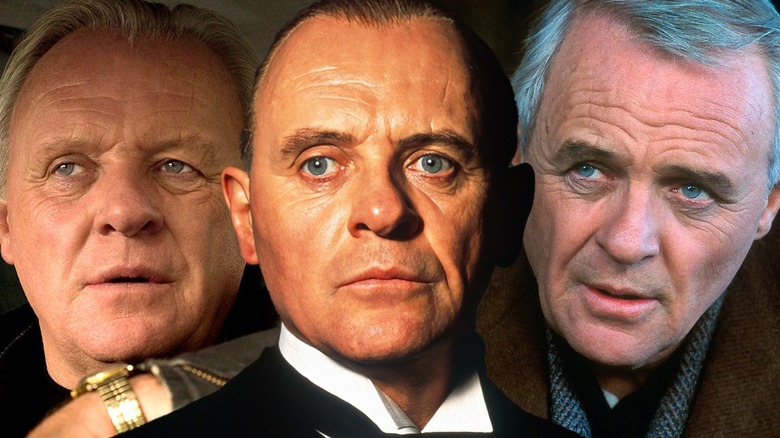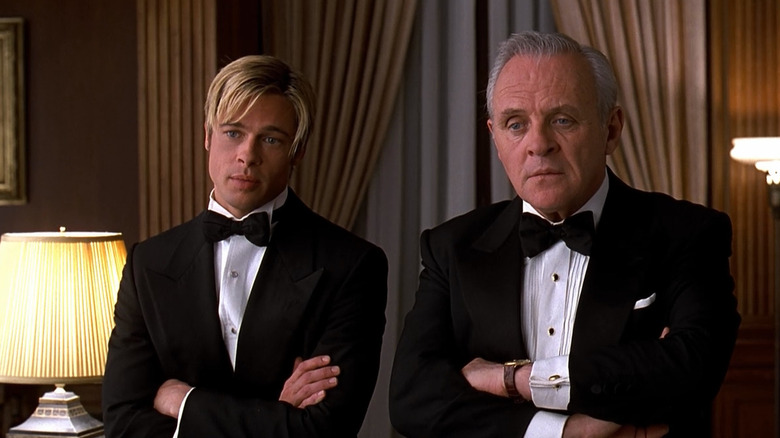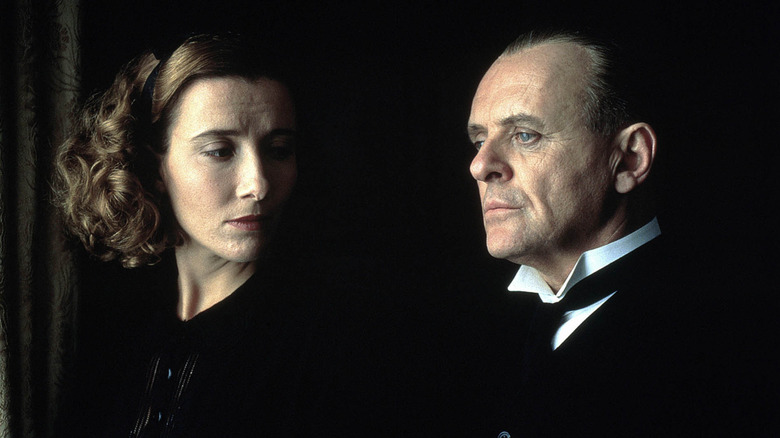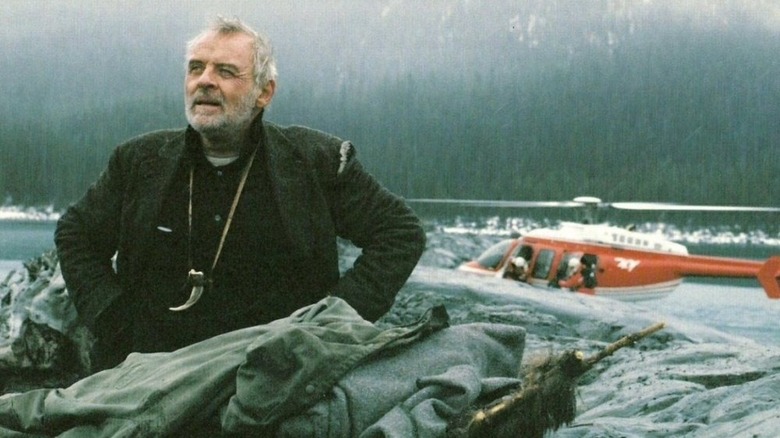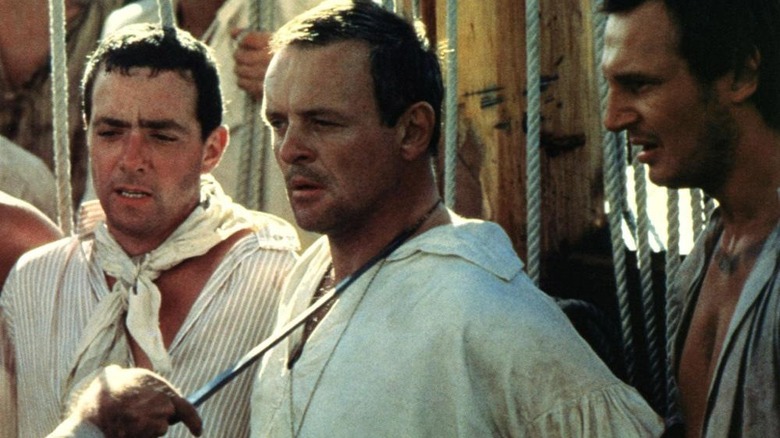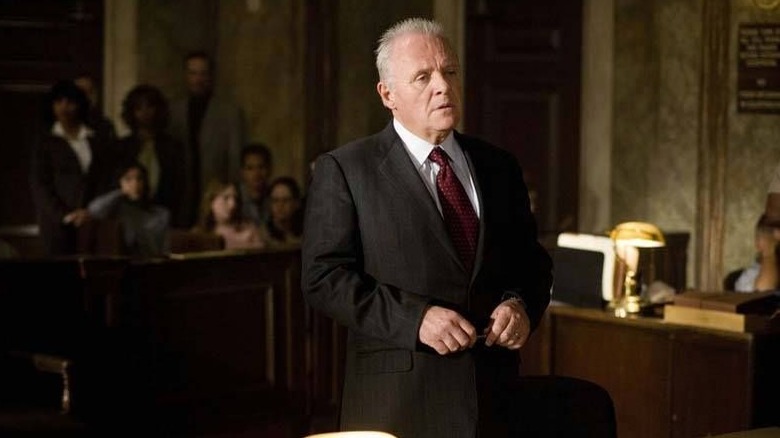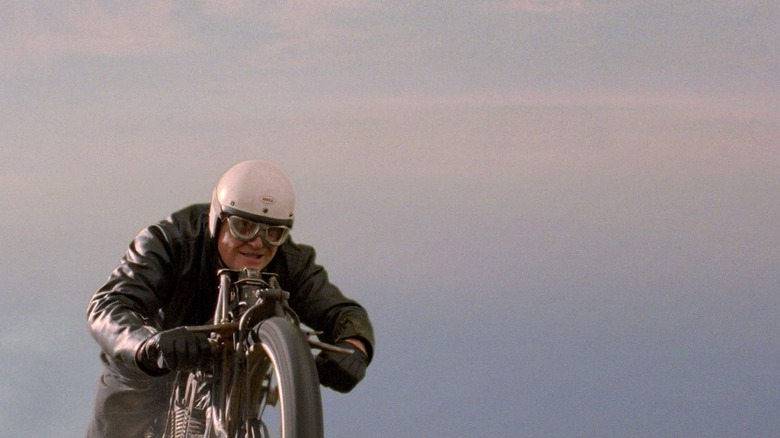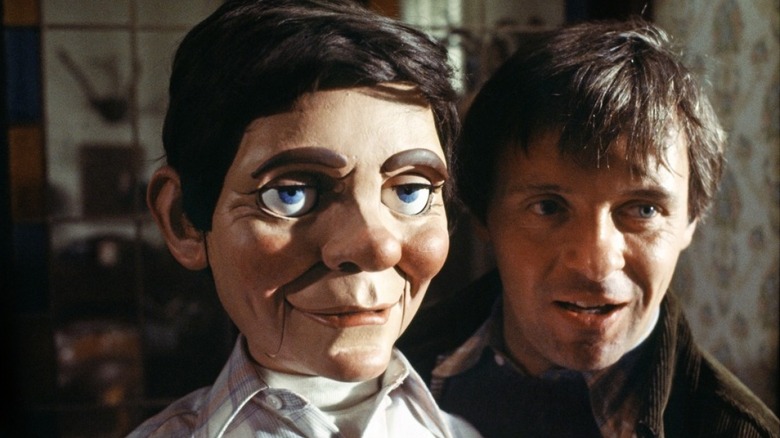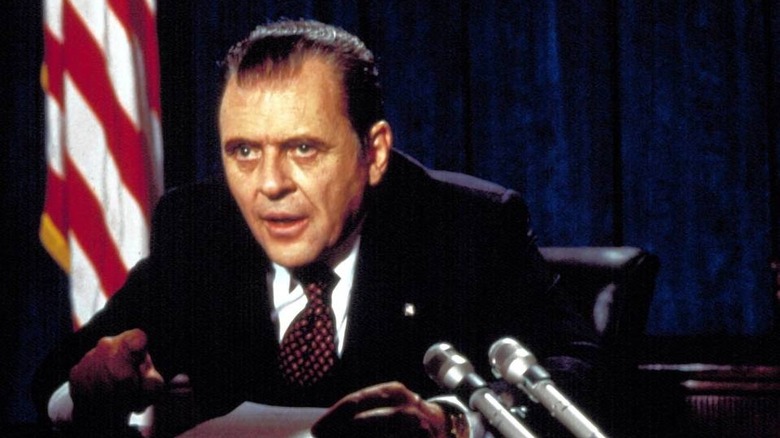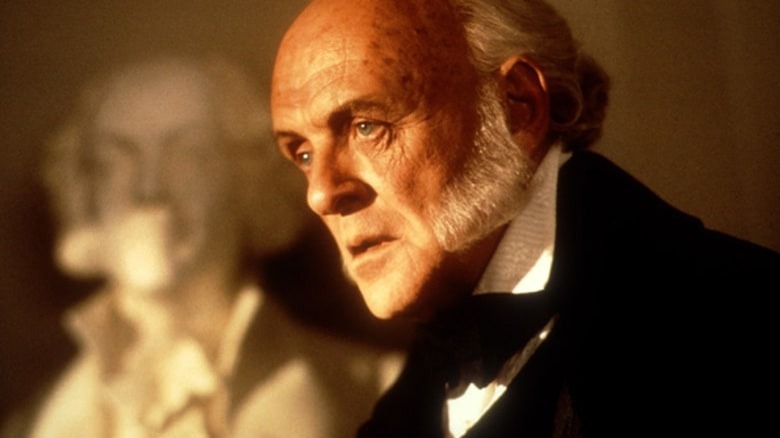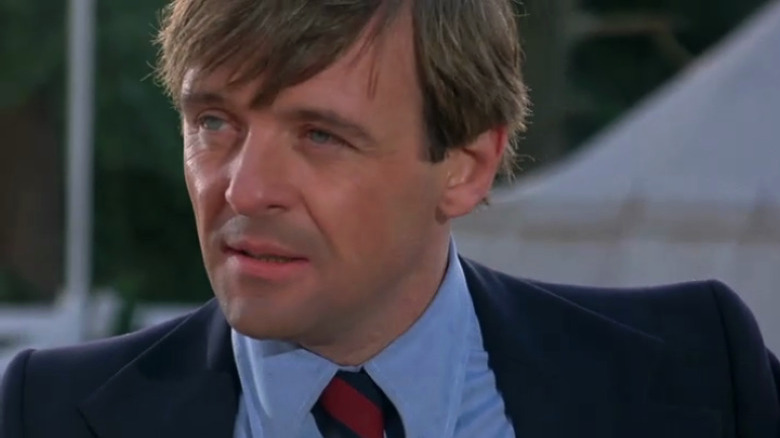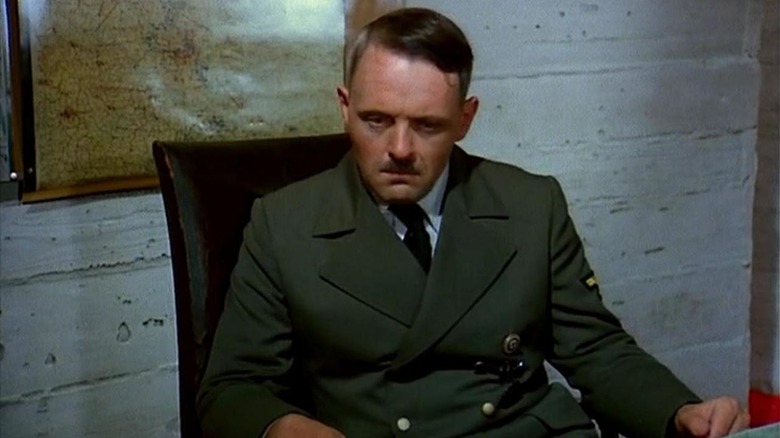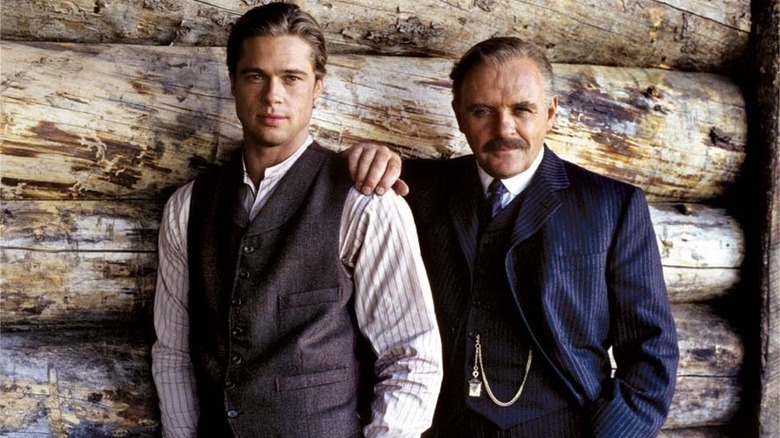12 Underrated Anthony Hopkins Movies You Need To See
With over 100 acting credits to his name, many of which are bonafide legendary performances, Anthony Hopkins has proven himself time and again as one of the best actors of his generation, and possibly of all time. After graduating from London's famed Royal Academy of Dramatic in 1963, Hopkins began his career on the stage, tackling the bard, as well as classic and modern plays at the Royal Court Theatre and The Old Vic. He also regularly appeared on British television, taking on episodic guest roles in shows like "The Man in Room 17" and "Department S."
In 1968's "The Lion in Winter, " Hopkins had his cinematic breakout role as Richard the Lionheart. Often remembered for the best actress tie between Katharine Hepburn (as Eleanor of Aquitaine) and Barbra Streisand (for "Funny Girl") at the Academy Awards, "The Lion in Winter" saw Hopkins more than hold his own against stalwarts Hepburn and Peter O'Toole. It would be a sign of things to come for the Welsh actor, who has since brought to life some of history and cinema's most enduring characters, including Zorro, C.S. Lewis, John Merrick, and of course, Hannibal Lecter.
Given the number of performances he has delivered across nearly 60 years, it's no surprise that a number of Hopkins' films have been overlooked by audiences and some even under-appreciated by critics. To help fill those gaps, here are 12 underrated Anthony Hopkins movies that you need to see.
Meet Joe Black
It has always baffled me how much this touching and poignant film was derided by critics when it was released. Directed by Martin Brest, "Meet Joe Black" tells the story of Bill Parrish, a soon-to-be 65-year-old media mogul whose time on Earth is coming to an end. Death appears to Bill in the form of a handsome young man (Brad Pitt), who strikes a deal with Bill after being enamored by Bill's relationship with his daughter, Susan (Claire Forlani). In exchange for more time in this life, Bill will act as Death's guide on Earth.
Sure, there are far too many saccharine moments and the film moves at a snail's pace, but beneath all that languid syrup is a movie rich in thoughtful dialogue about life and our place in the world. The idea that Death painstakingly wants to learn about what makes life worth living is fascinating, and Pitt and Hopkins' performances elevate the script to undeserving heights. "Meet Joe Black" isn't a perfect film by any stretch of the imagination, but its meditation on life, loss, and love warrants a lot more attention and praise than it was given.
The Remains of the Day
Admittedly, "The Remains of the Day" is an odd choice for a list like this. The James Ivory-directed film was a box office success, nominated for eight Academy Awards (including best picture and best actor for Hopkins), and was named by the British Film Institute as one of the 100 best British films of the 20th century. Its inclusion on the list is simply due to the fact that this film has somehow been lost to time.
"The Remains of the Day" is adapted from Kazuo Ishiguro's impossibly gorgeous novel of the same name, which itself has been well recognized (including winning the Booker Prize in 1989). Perhaps one of the reasons this film has become under-appreciated in the years since its 1993 release is because not much happens across 2 hours. The movie is wildly subtle in its storytelling, mostly existing in Mr. Stevens' (Hopkins) unreliable head — the butler with a blind devotion to his household to the degree where reality is bent in the name of service. A movie that received its flowers in its day, but whose recognition faded with time, "The Remains of the Day" remains a jewel in Hopkins' crown.
The Edge
Before Cocaine Bear terrorized campgrounds, Hopkins and Alec Baldwin attempted to outsmart a Kodiak bear after crash-landing in Alaska. A survival thriller, "The Edge" is directed by Lee Tamahori and written by David Mamet, best known for writing "Glengarry Glen Ross." We follow billionaire Charles Morse (Hopkins) and photographer Bob Green (Baldwin), as they face numerous obstacles on their way to reuniting with civilization. Chief among them is a fearsome bear keen on ripping them apart.
"The Edge" offers moments of nerve-racking tension as the elements of the Alaskan wilderness come down on our survivors. What separates the film from others of its ilk, though, is the personal drama and associated revelations that transpire between Charles and Bob. Tamahori and Mamet balance these aspects of the film with a layered nuance, resulting in an action-packed story with a grounded heart. "The Edge" made a minor ripple upon its release, but it's well worth the brawny ride.
The Bounty
"The Bounty" is a prime example that assembling a cast of the day's best and brightest actors does not a successful movie make. It almost seems impossible today that a historical drama from the 1980s starring Hopkins, Mel Gibson, Laurence Olivier, Daniel Day-Lewis, and Liam Neeson wasn't a draw for audiences (granted, the latter two were just beginning their careers). But alas, while the film earned decent reviews, it simply didn't garner enough interest from ticket buyers — "The Bounty" was cast out to sea by audiences in 1984, and undeservingly so.
A retelling of the infamous mutiny on the HMS Bounty, "The Bounty" is a film epic in scale, using a fully functional replica of the vessel and shooting locations around the world. An interesting twist lent to "The Bounty" was in Hopkins' portrayal of Lieutenant William Bligh, the ship's commander. Rather than villainizing the officer as had been done in previous cinematic iterations of the event, Robert Bolt's script is far more sympathetic to Bligh. Hopkins is positively brilliant in the part, and while in supporting roles, the charisma and potential of Day-Lewis and Neeson are glaringly evident.
Fracture
It's without argument that Hopkins is one of the best in the business at delivering sinister. Hannibal Lecter is an obvious example, but Hopkins' turn as Ted Crawford in 2007's "Fracture" is worthy of a mention. Played in a stoic and solemn manner, the character's cruelty is increased ten-fold because of Hopkins' talent at unnerving audiences. A two-hander with Ryan Gosling, the Gregory Hoblit-directed psychological legal thriller sees Gosling as Assistant District Attorney Beachum engaging in a game of cat and mouse with Ted, a man who kills his wife in the opening moments of the film.
Similar to Hannibal Lecter, there isn't any question or mystery surrounding Ted's innocence or lack thereof, but even so, Hopkins' choice to pepper his performance with an amusing playfulness has us second-guessing ourselves. The contrast between Beachum's renewed desire to find justice and Ted's astounding arrogance in the face of criminal proceedings builds an enticing tension that's bolstered by tremendous performances from Hopkins and Gosling. "Fracture" was well-received by critics and made a respectable return at the box office, but for both actors, this is one film that too often goes under the radar.
The World's Fastest Indian
Reuniting Hopkins with his "The Bounty" director Roger Donaldson, "The World's Fastest Indian" is a charming, feel-good sports film about New Zealand speed bike racer Burt Munro. Munro had spent many years modifying his Indian Scout motorcycle and found success in New Zealand and Australia's racing circuits. By 1967, when the film picks up, Munro is ready to realize his dream of conquering the U.S. — with his eyes set on the Bonneville Speedway.
"The World's Fastest Indian" was well-received in New Zealand (in spite of Hopkins deciding not to adopt a Kiwi accent and instead using his native Welsh lilt), but failed to make a splash elsewhere. Accent choices aside, Hopkins lights up the screen as the New Zealand folk hero. Maybe because we're too used to seeing Hopkins take on heavy (and often darker) characters, one of my favorite aspects of the film is seeing the lightness and unabashed joy the actor clearly takes in bringing Munro to the screen. There's a refreshing coziness to his performance that endears the racer to audiences unfamiliar with his story, making it a movie well worth the effort to seek out.
Magic
The legacy of Hopkins' Hannibal Lecter really can't be understated enough. He's a character so terrifying and so perfectly portrayed by Hopkins that, in a career with too many impeccable performances to count, one greatly overshadows the others. This is the only reason I can attribute to Richard Attenborough's "Magic" not getting the love it deserves.
A film that I watched at a too-young age, "Magic" scared me to the point that I still feel uneasy about ventriloquists and their dummies. Hopkins plays a failed magician, Corky, who turns to ventriloquism to revive his career. Corky and his dummy, Fats, begin to find some success, even being offered a television spot. When Corky duplicitously rekindles his romance with a former sweetheart (played by the renowned Ann-Margret), Fats becomes jealous and displeased. A strange movie that explores mental illness and the ego to an extreme, "Magic" is a delirious tale with Hopkins delivering a unique turn.
Nixon
Four years prior to "Nixon," Oliver Stone released "JFK," exploring the titular president's assassination and garnering criticism for embracing the many conspiracy theories surrounding the event. Conceivably, this left audiences wary of what Stone's treatment of former President Richard Nixon would entail. It would appear that Stone did learn something from "JFK," as he begins "Nixon" with a disclaimer that the film is "an attempt to understand the truth" — carefully, and pointedly, separating itself from the actual truth.
Regardless, Stone's attempts to understand Nixon as a man, warts and all, rubbed many the wrong way with statements given by the Richard Nixon Library and even Walt Disney's daughter. The film would go on to receive four nominations at the Academy Awards, including one for Hopkins' performance as Nixon, but only grossing $13.6 million domestically against a reported $44 million budget. Although the accuracy of "Nixon" has been skewered many times over, it remains a fascinating depiction of a controversial figure, backed by an impressive performance by Hopkins.
Amistad
Hopkins received yet another Academy Award nomination for his turn as former president John Quincy Adams in Steven Spielberg's historical courtroom drama "Amistad." Telling the story of the Spanish slave ship, La Amistad, and the slave revolt that took place on board by Mende captives, "Amistad" concerns itself mostly with the legal battle that occurred afterward. The U.S. wanted to bring piracy and murder charges against the slaves, but the Spanish government supported two of their citizens in the case as owners of these individuals, creating a potential diplomatic incident.
Although "Amistad" became a critical darling and was acknowledged by various awards bodies and critics groups, it failed to have much of an impact at the box office. Given the run Spielberg was on in the '90s, it's understandable that at least one of his films may not appeal to the masses. In a sense, the same issue is at play when considering "Amistad" in the years since its release: both Spielberg and Hopkins have developed such illustrious careers, films like "Amistad" fall by the wayside.
International Velvet
A timeless classic, 1944's "National Velvet" is a certified tear-jerker that introduced the world to Elizabeth Taylor. As is usually the case, a sequel wasn't necessary, but happened anyway, albeit 34 years later. The follow-up, "International Velvet," focuses on Sarah Velvet Brown (Tatum O'Neal), who is forced to move to England from Arizona to live with her Aunt Velvet Brown (the role Taylor originated and played by Nanette Newman in the sequel) after the untimely death of her parents.
While "International Velvet" didn't quite hit the emotional notes or dramatic overtures in the same way as its predecessor, the film remains an old-fashioned family film with plenty of heart and joy to go around. Hopkins takes up the role of Captain Johnson, Sarah's coach on the British Olympic team, and Christopher Plummer rounds out the ensemble playing John, Velvet's partner. It may not be a classic in its own right, but the strong cast, beautiful cinematography, and moving score make "International Velvet" an endearing coming-of-age tale.
The Bunker
This one may be cheating, as Hopkins won an Emmy for his performance in "The Bunker" as Adolph Hitler, but it's precisely because it is a made-for-TV movie that the film qualifies for this list. Given the nature of television in 1981 (i.e. not streaming), following the initial broadcast, a film like "The Bunker" would need to be caught on re-runs. And what a shame for those who missed it, as "The Bunker" features one of Hopkins' finest performances.
The story takes place between January and May 1945, reenacting key events from within the Führerbunker in the last few months of Hitler's life. What impresses the most about "The Bunker" isn't the accuracy of the production or even the accuracy of Hopkins' disturbingly visceral performance. Where the film excels is the glimpse into the psyche of one of humanity's most inhumane inching towards inevitable failure. Hopkins brings to the fore the cracks and vulnerabilities of the Führer in his final days as he descends into a desperate madness.
Legends of the Fall
It seems that whenever Anthony Hopkins and Brad Pitt join forces, they create under-appreciated magic that divides audiences and critics. Directed by Edward Zwick, "Legends of the Fall" follows the lives of the Ludlow brothers, Alfred (Aidan Quinn), Tristan (Pitt), and Samuel (Henry Thomas), and their father Colonel William Ludlow (Hopkins) across multiple decades as they confront love, life, and brotherhood together and apart.
There is an eloquence to Susan Shilliday and William D. Wittliff's script that is echoed and lifted by the truly exemplary performances from the entire ensemble with Pitt and Hopkins once again leading the way. The stunningly gorgeous film (for which John Toll won the Academy Award for best cinematography) can fall on the side of schmaltzy and corny at times, but ultimately, its dissection of a family's struggle with their circumstances and each other is moving and affecting in all the right moments.
